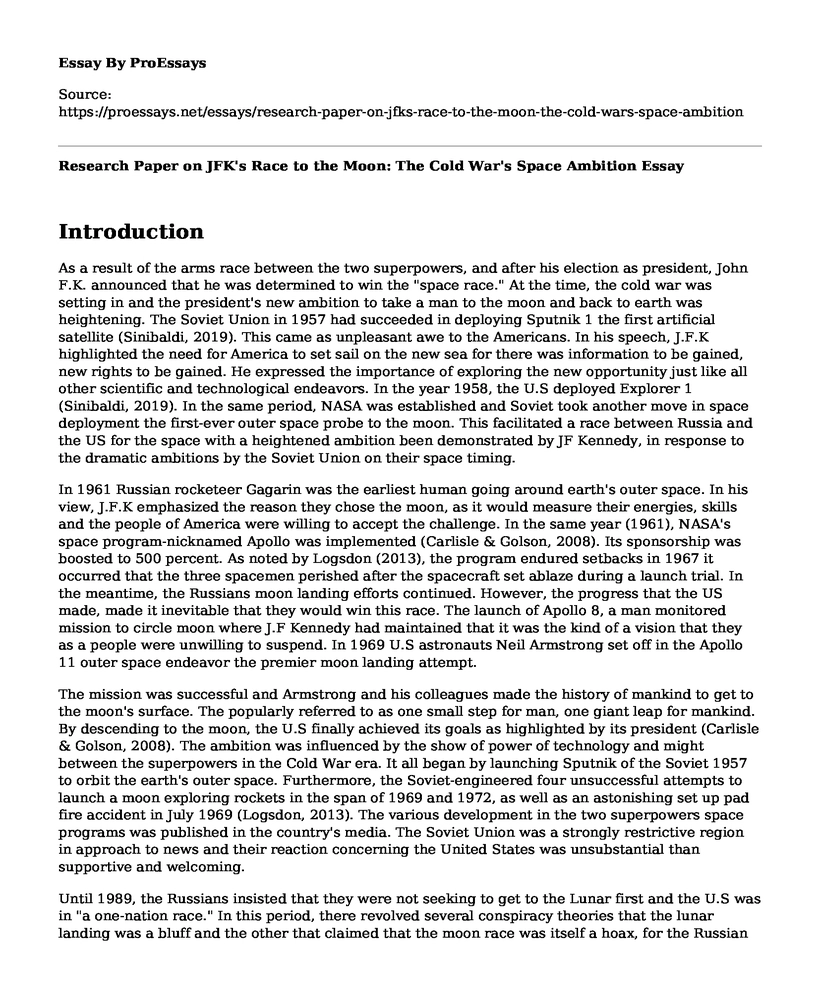Introduction
As a result of the arms race between the two superpowers, and after his election as president, John F.K. announced that he was determined to win the "space race." At the time, the cold war was setting in and the president's new ambition to take a man to the moon and back to earth was heightening. The Soviet Union in 1957 had succeeded in deploying Sputnik 1 the first artificial satellite (Sinibaldi, 2019). This came as unpleasant awe to the Americans. In his speech, J.F.K highlighted the need for America to set sail on the new sea for there was information to be gained, new rights to be gained. He expressed the importance of exploring the new opportunity just like all other scientific and technological endeavors. In the year 1958, the U.S deployed Explorer 1 (Sinibaldi, 2019). In the same period, NASA was established and Soviet took another move in space deployment the first-ever outer space probe to the moon. This facilitated a race between Russia and the US for the space with a heightened ambition been demonstrated by JF Kennedy, in response to the dramatic ambitions by the Soviet Union on their space timing.
In 1961 Russian rocketeer Gagarin was the earliest human going around earth's outer space. In his view, J.F.K emphasized the reason they chose the moon, as it would measure their energies, skills and the people of America were willing to accept the challenge. In the same year (1961), NASA's space program-nicknamed Apollo was implemented (Carlisle & Golson, 2008). Its sponsorship was boosted to 500 percent. As noted by Logsdon (2013), the program endured setbacks in 1967 it occurred that the three spacemen perished after the spacecraft set ablaze during a launch trial. In the meantime, the Russians moon landing efforts continued. However, the progress that the US made, made it inevitable that they would win this race. The launch of Apollo 8, a man monitored mission to circle moon where J.F Kennedy had maintained that it was the kind of a vision that they as a people were unwilling to suspend. In 1969 U.S astronauts Neil Armstrong set off in the Apollo 11 outer space endeavor the premier moon landing attempt.
The mission was successful and Armstrong and his colleagues made the history of mankind to get to the moon's surface. The popularly referred to as one small step for man, one giant leap for mankind. By descending to the moon, the U.S finally achieved its goals as highlighted by its president (Carlisle & Golson, 2008). The ambition was influenced by the show of power of technology and might between the superpowers in the Cold War era. It all began by launching Sputnik of the Soviet 1957 to orbit the earth's outer space. Furthermore, the Soviet-engineered four unsuccessful attempts to launch a moon exploring rockets in the span of 1969 and 1972, as well as an astonishing set up pad fire accident in July 1969 (Logsdon, 2013). The various development in the two superpowers space programs was published in the country's media. The Soviet Union was a strongly restrictive region in approach to news and their reaction concerning the United States was unsubstantial than supportive and welcoming.
Until 1989, the Russians insisted that they were not seeking to get to the Lunar first and the U.S was in "a one-nation race." In this period, there revolved several conspiracy theories that the lunar landing was a bluff and the other that claimed that the moon race was itself a hoax, for the Russian was never pursuing to explore moon from the beginning. Or rather, the Soviet Union was trying to conceal its failed moon landing attempts. When the U.S alighted man on the moon surface, the prose they put across was very universal. They uttered it as a victory "for all mankind" and there was a lot of discussion about all populace on the universe as being one. In conclusion, it reflected what J.F.K had said in his Nation address that space could be investigated and perfected in the absence of warfare. He added that there was no competition, prejudice or national conflict in the outer space.
References
Carlisle, R. P., & Golson, J. G. (2008). America in revolt during the 1960s and 1970s. Santa Barbara, Calif: ABC-CLIO.
Logsdon, J. M. (2013). John F. Kennedy and the race to the moon. New York, NY: Palgrave Macmillan.
Sinibaldi, R. (2019). John F. Kennedy: From florida to the moon. S.l.: Arcadia Pub.
Cite this page
Research Paper on JFK's Race to the Moon: The Cold War's Space Ambition. (2023, Feb 02). Retrieved from https://proessays.net/essays/research-paper-on-jfks-race-to-the-moon-the-cold-wars-space-ambition
If you are the original author of this essay and no longer wish to have it published on the ProEssays website, please click below to request its removal:
- Research Paper on King Tutankhamun's Canopic Coffinette
- Essay Sample on Violation of Human Rights
- Essay Sample on Erechtheion
- Essay Sample on Odinga: Legendary Hero of Siaya Kingdom, Son of God Jaramogi
- Essay on Mexico-American War: Cultural Adaptation, Political Discrimination, and Identity Formation
- Essay on Sociology and Holocaust/Genocide Studies: Analyzing Human Rights Violations
- Essay Example on Early Dynastic Period: 2900-2350 BCE - A Cultural & Political Transformation







